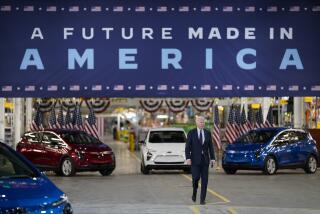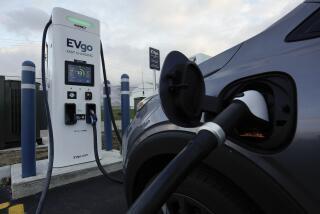On Germany’s autobahns, ‘Geschwindigkeitsbeschraenkung’ is a four-letter word to many
With no upper speed limits in most of the country, German autobahns are veritable racetracks for some who whoosh by on the runway-like freeways as fast — or faster — than a jetliner at takeoff.
They are also a troubling source of rising carbon emissions for a country that fancies itself a leader in the fight against climate change.
Some Germans opposed to the freeway free-for-all have been putting a spotlight on the higher carbon emissions, the inherent dangers and the powerful car lobbies that quietly and efficiently manage to maintain the status quo.
But the right to drive as fast as cars can go is considered sacred by many Germans, and talk of taking away that entitlement with speed limits is seen as blasphemy.
Tensions between the two sides flared again in recent weeks after the preliminary findings of a low-level government panel exploring ideas to cut carbon emissions were leaked. One of the proposals — to introduce an 80-mph motorway speed limit, or Geschwindigkeitsbeschraenkung — was immediately condemned by the omnipresent opponents of a limit.
“The debate in Germany is totally irrational,” said Cem Oezdemir, a leader in the pro-environment Green Party and regular target of wrath. “For some people, calling for a speed limit in Germany seems to feel like the state is calling for some kind of official decree to limit your virility.”
In part because of the high speeds, Germany’s motor vehicle carbon emissions have risen by 6% since 2010. The nation had promised in the Paris Climate Accord that by 2020 it would cut its overall carbon dioxide emissions by 40% from 1990.
Germany will miss that target, in part because of the lack of progress in cutting transportation emissions.
The German Federal Environment Agency has forecast that reducing speeds to a maximum of 75 mph would cut carbon dioxide emissions from cars on motorways by 9% — or by 3 million tons per year.
The widespread belief that everyone in Germany should be allowed to put their pedal to the metal on the autobahn — without any government interference — has been impervious to arguments about carbon emissions, or about crashes.
About 400 people are killed every year in freeway crashes that, while occurring at a comparatively low rate considering the numbers of miles driven and in contrast to other countries in Europe, are often more ghastly. In one horrific 2004 crash, an off-duty Mercedes test driver going 135 mph tailgated a 21-year-old single mother who lost control of her Kia; the woman and her 2-year-old daughter were killed.
Police leaders have said that about one in four deaths and some of the 5,000 severe injuries suffered each year could be prevented with a speed limit.
“Some people legally drive 120 mph to 150 mph in this country,” Michael Mertens, deputy leader of the national police union, said in a recent interview with Suddeutsche Zeitung newspaper. “That’s simply insane. At those high speeds no one can stay in control of their car if something unexpected happens.”
Because of the high speeds, fear is a constant for many Autobahn drivers.
“Lots of people get panic attacks on the Autobahn,” said Alexandra Baerike, a psychologist and driving instructor in Cologne. “The enormous differences in speed can be intimidating.”
“There are some nasty drivers who behave badly — tailgating and trying to force others out of their lanes by flashing their lights and getting too close,” said Baerike, whose thriving specialized practice has helped about 3,000 German drivers overcome their freeway phobia. “You need a thick skin to survive.”
Even Tom Hanks found the German motorway speeds daunting, as he once famously explained. “No matter how fast you’re driving in Germany, someone is driving faster than you,” Hanks told David Letterman in 2012.
But for some, that’s the whole idea.
“The principle of freedom has proven its worth. Anyone who wants to drive 75 mph can drive 75 mph. Those who want to drive faster should be allowed to drive faster,” Transport Minister Andreas Scheuer said in a recent interview in the Bild am Sonntag newspaper. “What’s the point of telling people what to do all the time? German freeways are the safest in the world. We’ve already got speed limits on a third of the autobahn. The system we’ve got in place now works just fine.”
The General German Auto Club, known by its initials ADAC, Europe’s largest national motor club, has thrown its influence behind the issue. And with ADAC’s membership of more than 20 million, a number that’s nearly a quarter of Germany’s population and covers most car owners, that influence is considerable.
The ADAC battle cry, “Free travel for free people,” first appeared in West German election campaigns during the Cold War era to try to intimidate any politicians from calling for speed limits. But it still resonates among hard-liners viscerally opposed to the government telling them how fast they can drive.
Defending the freedom to drive at blinding speeds on highways first built in the 1930s — ostensibly for the coming age of mass car travel, but in reality more for Hitler’s army — is fraught with historical baggage.
“It’s been a very emotional issue in Germany for a long time,” said Claudia Kemfert, professor for energy economics at the DIW Berlin, the German Institute for Economic Research. “We’re pretty much the only country in the world without a speed limit.”
About two-thirds of Germany’s 8,100 miles of freeways have no speed limits; opinion polls show that about half of Germans, and most political parties, want to keep it that way. A recent poll by the ARD TV network found 51% of those surveyed wanted an 80-mph limit, and 47% opposed it.
Those who oppose the limits have generally been more vocal.
“There are very powerful lobbying forces against speed limits,” said Carsten Brzeski, chief economist at Ing Diba bank in Frankfurt. “It’s like gun control in the United States because hardly any politician dares get near the subject of speed limits.”
Germans wonder why the United States cannot make progress on curtailing gun violence, Oezdemir said, while foreigners wonder why Germans cannot make any progress on getting freeway speed limits.
“Every country has their blind spot,” Oezdemir said. “And it makes people lose their minds.”
The freeways are seen as a hallowed proving ground for car makers such as Porsche, BMW, Mercedes and Volkswagen, which build their cars for the high-speed pressures in Germany and count on that image of performance to help sell the vehicles abroad.
Managers and unions of those blue-chip companies fear freeway speed limits would tarnish their reputation and cost jobs. There are tourist groups from as far afield as China and the United States that travel to Germany just to drive at top speeds.
“We’ve talked ourselves into believing this idea that people won’t buy German cars if there’s a speed limit here. It’s not true,” said Ferdinand Dudenhoeffer, a German car industry analyst at the Center for Automotive Research at the University of Duisburg-Essen.
He noted that he once worked as a manager at Porsche, where many wondered why so many Americans bought the sports car despite the 55-mph speed limits in the United States.
“It’s like people in America saying they won’t feel free without guns,” he said. “Everyone knows that doesn’t make any sense. It’s the same thing in Germany with speed limits. It’s a myth.”
But the argument that’s spanned decades shows no signs of abating.
In an unsuccessful attempt to stop the debate recently, Chancellor Angela Merkel’s spokesman Steffen Seibert said there were better ways to combat climate change through the transportation sector than limiting drivers on Germany’s freeways.
“The government,” he said, “is not planning to introduce a general speed limit.”
Kirschbaum is a special correspondent.
More to Read
Start your day right
Sign up for Essential California for news, features and recommendations from the L.A. Times and beyond in your inbox six days a week.
You may occasionally receive promotional content from the Los Angeles Times.





